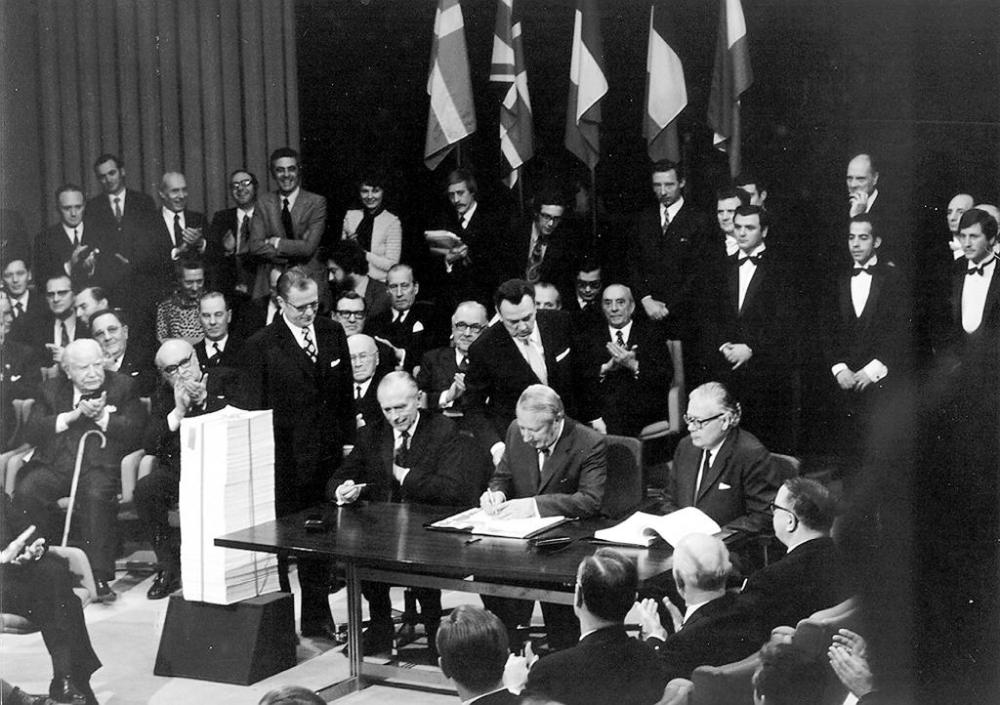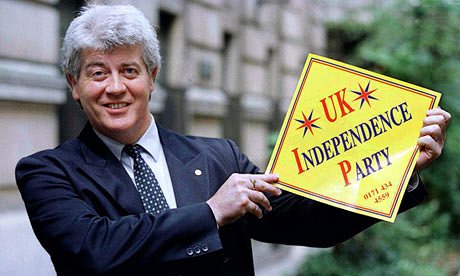200 hundred years ago, at Trafalgar, Britain’s freedom was ensured for more than a century. Now, our independence is under threat again. This time not by cannon fire and musket shots, but by the slow tide of regulations, edicts and treaties from the European Union in Brussels. For the past four decades we have been continuously signing away our independence in a sad story of dishonesty and evasion.
In the early seventies, Britain was an insular place. Dazed, after the rapid loss of empire, we seemed lost and adrift. For some this may have inspired a time of innovation and excitement, for others it seems like a strange and eccentric start to the decade. Many could only dream of purchasing a new cooker, a black and white TV set or possibly even a holiday abroad. An unloved Tory government ran a discontented country with a small parliamentary majority- with Edward Heath being Prime Minister. The early 70s were dominated by a series of strikes, fuel shortages and rising inflation but Heath’s most treasured aim was to join, what was then called, the common market, claiming it would end our economic woes. He also believed that our political future lay on the continent, with a united and federal Europe.
Heath, having failed to join in the early 60’s under the McMillan government, applied to join in 1970. It is now that he would succeed.
On the fringes, there were doubters on both the right and left but they were dismissed as extremists by the establishment at the time, even though their arguments turned out to be sound. The leading Tory sceptic was Enoch Powell, a pale and intense intellectual. He had already at this point had himself sacked from the government, in 1968, for his inflammatory rivers of blood speech on immigration. For many, his message on Europe was drowned out by his stance on Immigration. Back then the sceptics, known as anti-marketeers, were a small and isolated band. Enoch Powell’s main argument was that sovereignty lay in national parliament.
Powell’s determination was equally matched on the left by Labour’s Anthony Wedgewood Benn, as he was then called. Tony Benn (as he is more commonly known) lead the anti-marketeers. He saw, earlier than most, the threat that Brussels faced to our sovereign power.
Benn and Powell, were by no means entirely alone. On the streets, opposition came from those who were most directly affected, British farmers. They feared the common agricultural policy. Nevertheless, Heath promised a golden age for us all. Ignoring opposition from farmers, fisherman and trade unions, the Labour party, Heath and an uncertain public marched on bringing the legislation to join the EEC before parliament. In the decisive vote, Labour were split. Heath, having kept strict contacts with Labour anti-Marketeers, was confident. 69 MPs, lead by Rory Jenkins, defected in favour of the Tory Prime Minister. Jenkins faced so much rage from the Labour Anti-Marketeers that his friends advised him to leave the building as soon as possible.
The legislation passed and Britain lost its independence.
On the 22nd January, 1972, Heath went to Brussels to sign the treaty who’s real significance he had kept from the British people. Many took Heath’s predictions at face value but now it is possible to see that Heath concealed the market’s ultimate destination from the public. Back then Europe’s leaders were already making plans to merge all the economies and currencies of all the common market countries. On the 9th of November, 1970, a document was prepared by 2 treasury officials on the implications of economic and monetary union. It states that many of the European countries “could be less independent than many of the 50 states in the USA”. This is something that has never been admitted in public ever since.

Heath was so anxious to join at all costs that he was joined the common fisheries policy. This would effectively destroy our fishing industry.
For many, the early impact of our joining was obscured by other events. Inflation, strikes, and the 1973 energy crisis caused by the Arab-Israeli war, are a few to name. Heath thought the 1974 minor’s crisis could be used to draw Labour towards to his cause and might help him win a snap election. His opponent, Harold Wilson had promised a referendum on Europe, mostly to cover up the splits within his own party. Enoch Powell subsequently urged his supporters to vote Labour, putting country above party. Powell’s brief intervention helped tip the balance and Labour won a narrow victory with the first referendum to now be held. From the start of the referendum campaign, it wasn’t a fair fight. Though the polls showed a majority for quitting, millions were open to persuasion.
Margaret Thatcher, a surprise choice to replace Heath, had a prominent voice in the cross party YES campaign (YES= stay). The NO campaign suffered badly from its lack of any serious establishment support. The sceptics were stuck with the unwelcome support from the far right and the far left. The Pro-EU camp were backed by the European commission and pro-EU businessmen. The unequal contest, therefore, ended with an unequal result.
In the summer of 1975, the campaign was quickly forgotten. Other issues now dominated politics. Economic decline seemed unstoppable, strikes seemed uncontrollable and the left seemed to continue its takeover of the labour party. Jim Callahan succeed Harold Wilson as the head of a minority government and, thus, Europe seemed a closed issue.
By 1979, with Britain knee deep in rubbish and strikes meaning that not even bodies were being buried, Margret Thatcher won office.

By 1979 Europe was a side issue. She wanted to break the unions and liberalise the economy. The sceptics were an irrelevance.
While the Tories drifted complacently, the issue was still very much alive in the Labour party. The party’s hard and sceptical left used the 1979 defeat to seize power, turning against, what they saw to be, a capitalist plot. Loveable but ineffectual Michael Foot became leader whilst Tony Benn appointed himself the workers champion. By 1983, Labour were wholly committed to withdrawal from the European community. The manifesto stated plainly that “British withdrawal from the community is the right policy for Britain to be completed well within the lifetime of the parliament.” Thanks to Foot’s far out policies and Thatcher’s Falklands triumph, Labour were annihilated in the 1983 election. Neil Kinnock inherited the seemingly hopeless task of leadership.
By 1984, the combative Margaret Thatcher faced her first real fight in Europe. At Fontainebleau, Margaret Thatcher faced a rebate battle against the French and Germans. Britain’s huge net contributions to the community were plainly unfair but this was not a fundamental clash of principle. Her aim was to make Britain’s membership more bearable, not to undermine it. She succeeded in cutting our contribution by a third.
Thatcher wanted to complete the single market which supposedly meant that it would be easier to sell British goods in European markets on equal terms. Ministers thought it would boost our newly deregulated economy. However, in return, we had to hand over important decision making powers to Brussels and lose many of our national vetoes.
In Brussels, running the commission, was Jacques Delors- the man, Margaret Thatcher thought, who would help with the creation of the single market. However, she hadn’t grasped that Delors was a keen federalist who had advanced plans for a United States of Europe, together with economic and monetary union. At the Luxembourg summit, in 1985, Margaret Thatcher agreed to an act which would hand substantial power to Brussels. Now, in 12 areas of decision making, we could be out voted or overruled from the other members of Europe.
As a deregulated city boomed, small business was swamped by a mudslide of European prescribed rules. The Single European act was a major step towards political and economic union, mis-sold as an opening up of markets. The sceptics had failed to pay enough attention to it so it slipped easily and quickly through parliament.
Margaret Thatcher went on to win a third election in 1987. She, and her government, were tired and stale but weak opposition kept her in office. Her cabinet was restive and many colleagues had yearned to displace her and she was starting to have serious doubts about Europe.
Margaret Thatcher’s alarm grew when Jacques Delors made a provocative visit to the trade union congress- fraternising with her sworn enemies. She and Labour realised that Europe was a way on undoing Thatcherism by the back door. That discovery turned her into a Euro-sceptic and swung Labour into a plague of Euro-enthusiasm. Inspired by Delors, Labour constructed itself into a pro-European party, which it has been ever since.

Hearing the Delors speech at the trade union congress, Margaret Thatcher abandoned her holiday in Cornwall and began drafting her response. Now the sceptics, outsiders for so long, at last had an ally in the centre of British politics. Her speech, in the city of Bruges, would be a decisive moment.
“We have not successfully rolled back the frontiers of the state in Britain, only to see them re-imposed at a European level with a European super state exercising a new dominance from Brussels” (extract from the speech).
The divisions in the Conservative party were now sharper because she had thwarted the ambition of so many of her colleagues. She was isolated and exhausted. However, her scepticism spurred others on and anti-Brussels groups sprung up around her.
One reason for the Tory EU revolution was that the Thatcher economic miracle was running into trouble. After the boom of the 80s came the bust of the early 90s. However, what was worse was the exchange rate mechanism which was the first step towards merging the currencies of Europe. It remains a great paradox that Margaret Thatcher, of all people, should have been Prime Minister when Britain joined the fateful step of joining the ERM. She now faced an inexorable timetable which would take Britain into further absorption into a United States of Europe. The closer she was to her doom, the more sceptical she became.
Only weeks later, she was gone.
The European issue destroyed Margaret Thatcher, but her successor, John Major, proclaimed that he wished us to be “where we belong”- at the very heart of Europe. Very quickly, John Major got what he desired, and a good deal more. Ever closer union was still on the agenda. Major marched on the road to Maastricht. He felt that the things the treaty allowed him to opt out of matter. However, it has seemingly been the things that he couldn’t that have mattered more. The Maastricht treaty undermined a lot of what was traditionally held dear by the Conservatives, yet Major still rammed it ruthlessly through Parliament. Maastricht was the second of two considerable blows aimed at national independence and sovereignty. But unlike the first, the Single European Act, Maastricht was quite openly a plan for accelerating political and economic monetary union.
In 1992, John Major was re-elected. Just. His hopes for an easy passage of the Maastricht treaty were suddenly de-railed. Having lashed his reputation to the ERM, he could not bring himself to quit it when danger threatened. The city told a story of this danger as the economic facts of life asserted themselves. Homebound commuters were confused as they saw interest rates rise three whole points in one day. The Treasury’s doomed attempt to keep Britain in ERM cost £3.3billion, justly described at the time as the equivalent of chucking several modern hospitals into the sea. This not only destroyed the Conservative Party’s reputation for economic competence, but it put new fire into the bellies of all Euro-sceptics. Here was evidence that Europe, long touted as our salvation, was dangerous to our economy as well as our independence.
Seeing Major in trouble, the Sceptics pounced at that autumn’s Tory conference. Norman Tebbit turned on Major and united the view against Maastricht, still un-ratified. As Major enjoyed the new friendships made abroad, he made enemies at home with the ruthless crushing of Euro-sceptics. 9 days after Maastricht passed, Major (not knowing he was recorded) blurted out his true feelings about those who had opposed him, referring to them as “bastards”.
Michael Portillo and John Redwood outline this experience in a rather amusing way.
“There was an ambiguity because there were four Euro-Sceptics in the Cabinet and his (Major) remark was that I don’t want another three of the bastards out there. There was always a debate between the four of us as to which of us had been left out and not been described as a bastard.” (Michael Portillo).
“So I rang up number 10 and said:
Redwood: Well I hear that the Prime Minister has called me a bastard. I assume this is false, can I go and deny it?
No10: No you can’t.
Redwood: Well, if it’s not false, it would be very helpful if you gave me the line to take. Can i have the line to take as to whether I am or am not a bastard.
No10: There isn’t one. ” (John Redwood).
The unofficial line was that the Sceptics were bastards. However, in the end they failed to effect policy. Many of them concluded that the Tory party were not their friends but their foes.
Dr Alan Sked set up the anti-federalist league and stood in the 1992 election. A year later, whilst still lecturing at the London School of Economics, he started the United Kingdom Independence Party- now more commonly referred to as UKIP. The divisions in the conservative party hadn’t gone away because the Maastricht treaty had been ratified or that some party members had defected. Far from it. There was now a civil war as bad as Labour’s had been 20 years previously. Disastrously for the Tories, this became the centre story of the time- though it didn’t shift policy.

In a doomed effort to save the conflict, Major resigned and challenged his foes to stand against him. John Redwood alone dared to do so but his bizarre campaign made the sceptic cause look eccentric and freakish once again. He was left with a Tory platform full of old cranks and outsiders and the campaign failed.
The Tory government still had two more years of splits and disputes ahead. Defeated inside the party, many sceptics now looked elsewhere for salvation.
Edward Heath concealed the ultimate aim of the European project. Margaret Thatcher discovered far too late that it was impossible to be a patriotic Tory and a Europhile. Despite the opt-outs he negotiated, John Major had taken Britain far deeper into the European super state than any other Prime Minister and the civil war he waged against his opponents brought about the inevitable ruin of the Tory party.
Labour ought to have been the sceptics’ nightmare. Tony Blair was a self proclaimed Euro-enthusiast and his party, once pledged to leave, pledged to enter Europe as deeply as they could. However, it wasn’t quite so simple.
It’s own sceptics powerless, Labour threw away Major’s opt outs from the Maastricht social chapter protocol. Many thought that the decision to grant independence to the Bank of England was the first step to Euro membership, with the Euro itself moving rapidly from plan to reality-driven through by France and Germany. By 2002, the new currency was a reality.
A currency is not a symbol of independence, like a flag or an anthem, it is a fact of independence, like a border or a legal system.
“Whoever controls the currency, controls the country” (John Maynard Keynes). It is true that if you do not control your own interest rates or further economic policy, you have no independence.
Luckily for Britain, Blair lacked the nerve to hold his promised referendum on the Euro currency in case he lost. The canny Gordon Brown provided a formula to postpone Euro membership for as long as it suited him to do so.
Blair made one half hearted effort to please his European friends. In October 1999 he set up the cross party “Britain in Europe” campaign to persuade public opinion of the alleged benefits of the single currency. However he lost his nerve and felt that the time to push forward to Euro agenda would, indeed, be some other time.
The sceptics campaigned to real effect. Many influential figures, institutions and newspapers joined the cause with powerful and well researched arguments. Decisively, many in the city of London turned against the idea. Tory defectors helped UKIP win twelve precious seats in the European parliament. However, with the Euro issue defused, Labour easily won a second term in Westminster and the process of European integration went on unopposed and often unobserved.
Emboldened by years of uninterrupted moves towards final union, the EU’s leaders at last came out into the open and suggested a European constitution. An unmistakable step towards a European state. Plans for an EU president, defence force and EU foreign policy suddenly sprang into sharp focus. Tony Blair, imagining that these changes could be sold as a tidying up exercise, was one of the first to sign. Few realised that this was a step too far. It was here that the French and the Dutch who said no in twin referendums. These two founders of the project had, at last, discovered scepticism. Yet the project still marches on.
In the past four decades, sceptical politicians, from both left and right, who have stood in the way of the Brussels juggernaut, in the hope of slowing it down, have instead been squashed. The EU is a machine with no reverse gear. A sceptical Britain will never accept its final goal.